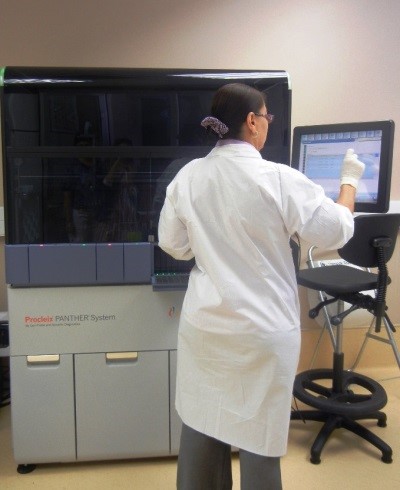Saving Blood, Saving Lives
10 Years of Partnership between NAMBTS and PEPFAR Namibia

Long time partners Marianne Wessels, NAMBTS and Anita Beukes, CDC-Namibia together at the new NAMBTS location in Windhoek.

A NAMBTS lab technician using the new Procleix Panther System

Dimitri Prybylski, Associate Director for Science, at CDC-Namibia getting ready to donate blood with NAMBTS outside of the U.S. Embassy.
Ten years ago, blood transfusion services across southern Africa faced a daunting challenge: How to collect enough safe blood when up to one in five potential blood donors was infected with HIV. In Namibia, where the national HIV prevalence estimate among adults peaked at 15.75% in 2002/03, Namibia Blood Transfusion Services (NAMBTS) used a number of strategies to successfully mobilize and retain a pool of blood donors with a much lower risk of HIV, and to screen 100% of all donated units for HIV. In 2004, the year CDC began supporting NAMBTS through PEPFAR, the prevalence of HIV among blood donors was about one-half of one percent – a remarkable accomplishment in a country with one of the highest HIV population prevalence rates in the world.
Since 2004 PEPFAR has provided almost US$10 million in direct assistance to NAMBTS. The funds were invested across several technical and administrative areas – from supporting human resources to an innovative agreement with the South African National Blood Service (SANBS) to test Namibian blood for HIV, hepatitis B and C, and syphilis. A new computer system allowed more efficient management of data on blood donors and blood units as they moved from collection to testing to the wards; new platelet collection machines helped increase the number of platelet units available each year while reducing the number of donors needed and; new training courses opened the way for a closer collaboration between NAMBTS and the Ministry of Health and Social Services on medical education. Dr. Bjorn von Finckenstein, NAMBTS’s Medical Director highlights that, “To a large extent, PEPFAR has made NAMBTS what it is today.” Over the last decade, PEPFAR’s investments have “contributed to the technological sophistication of NAMBTS’s blood collection and screening efforts.” In 2012 NAMBTS became fully accredited by international regulatory bodies, a rare achievement in sub-Saharan Africa and a testament to the impact of PEPFAR investments in Namibia.
In the past year with funding from PEPFAR and technical assistance provided by CDC-Namibia, for the first time NAMBTS has procured equipment (Procleix Panther System, seen at left) to enable HIV Nucleic Acid Testing (NAT) and screening of donated blood for transfusion transmitted infections (TTI) in Namibia. Prior to the acquisition of the machine, Namibia sent all blood to South Africa for testing. The HIV NAT test is a very sensitive test designed to detect HIV RNA in blood. RNA is the viral equivalent to human DNA. The NAT test is able to detect HIV RNA as early as seven to 14 days after infection with HIV. Unlike the p24 test, the NAT test will always give a positive result as long as there is HIV in someone’s blood. The ability to test blood in country is a great achievement enabling blood to be available for transfusions when needed.